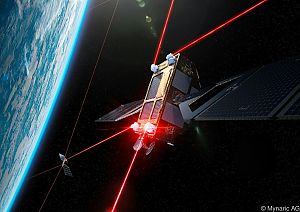EU relies on sovereign satellite communication with quantum cryptography

To achieve this goal, the EU Commission has now selected a consortium of small and medium-sized enterprises and start-ups to work out a detailed technical concept for an independent European satellite network. The Viennese start-up Quantum Technology Laboratories is responsible for the quantum cryptography part, its co-founder Rupert Ursin told APA.
The EU wants to improve Europe's lagging IT infrastructure with the "Digital Europe" infrastructure programme, explained Ursin, who has published numerous papers in the field of quantum communication, networks and cryptography at the Austrian Academy of Sciences (ÖAW) in recent years and founded the company Quantum Technology Laboratories in 2020. For example, Europe is to have its own satellite-based communication infrastructure by 2025, with which the EU will ensure its sovereignty in fast internet, autonomous mobility and self-acting exchange of information between technical systems, among other things. "Quantum cryptography has been given a very firm place here," Ursin said.
The consortium, made up of around 20 medium-sized European space companies and start-ups, is now to develop a concept for such a sovereign European satellite network and is being funded by the European Commission for six months with 1.4 million euros. The core of the consortium is formed by the satellite manufacturer Reflex Aerospace, the laser communication specialist Mynaric and the launch vehicle company Isar Aerospace.
Network of several hundred satellites
The consortium does not want to clog the low Earth orbits with thousands of satellites, but rather manage with a network of a few hundred satellites by intelligently combining different orbits. At the end of their service life, these satellites are to be quickly removed from space with a braking sail in order to avoid space debris.
In the study, several technology complexes necessary for this are to be analysed, researched and evaluated. These include linking radio links with optical communication, operating the satellites independently of GPS data and using concepts for distributing quantum keys to increase data security. Quantum Technology Laboratories is responsible for this quantum part. "Engineering offices derive action instructions for engineers from scientific laws - and that is exactly what we are doing with our quantum physics background for designs and blueprints of the satellite constellation," said Ursin.
Launch of first demonstrator as early as 2023
According to the statement, the consortium is preparing to launch a first satellite demonstrator as early as 2023. This will demonstrate variable transmission speeds of up to 100 gigabits per second as well as space-to-air and space-to-ground connections.
Ursin recalls that "the Austrian taxpayer has financed high-risk research in quantum physics in recent years, not knowing whether anything would ever come of it". Building on this, he now wants his company to "create the added value and the jobs here in Austria". Quantum Technology Laboratories now employs ten people and has a turnover of 1.7 million euros this year.
